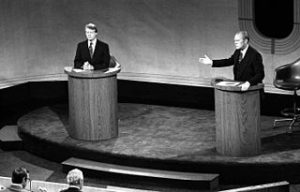 Before the end of this month we will have the first debates featuring an unprecedented slate of Democratic candidates for the 2020 presidential nomination.
Before the end of this month we will have the first debates featuring an unprecedented slate of Democratic candidates for the 2020 presidential nomination.
Debates can provide a lot of information about political candidates – the answers they give, while important, are only part of what you can learn from watching a political debate. Regardless of whether you’ll be watching the upcoming Democratic debates or not, here are some key things to watch for during any political debate.
The answers they give – How the candidates answer and what they say are obviously key to the debates. In addition to evaluating the content of their answers:
- Do their answers make sense?
- Are they clear and coherent?
- Are they actually answering the questions, or do they keep changing the subject and expounding on their own favorite “talking points”?
- Do they seem equally comfortable on all topics or are there some subjects where they seem weaker than others?
How they answer – The way they answer questions is also important.
- Are they quick or slow to answer? Hesitant? Beligerant?
- Are their answers clearly stated, or are difficult to understand? Do they sound confused?
- Do they rely on a lot of platitudes or is there substance to what they say?
The candidates’ demeanor
- Do they exhibit “grace under fire?” Or do they get overly defensive or aggressive?
- How do they act towards the moderators and the other candidates on stage? Are they respectful?
- Do they adhere to the debate’s time limit rules or try to keep talking even when it’s someone else’s turn?
- Do they spend more time attacking their opponents than explaining their own views?
- What about their body language?
All of these little things can tell you a lot about the temperament of the candidate. In our system of government, there’s always a lot of give-and-take necessary to come to an agreement and pass laws. This can be an important clue as to how they interact with others and subsequently how effective they will be at getting things done.
Fact checks – Fact checkers will doubtlessly be on their toes during and after the debates! If fact checks aren’t available during the debates, you can probably find them on transcripts afterwards.
Also, did the candidates’ statements during the debate match what they have said (and done) in the past?